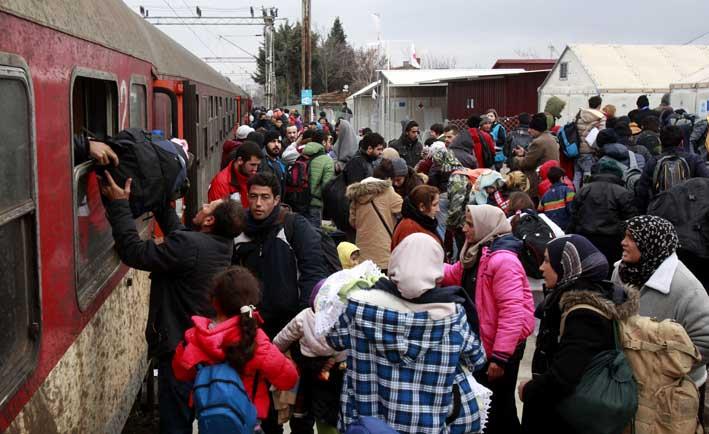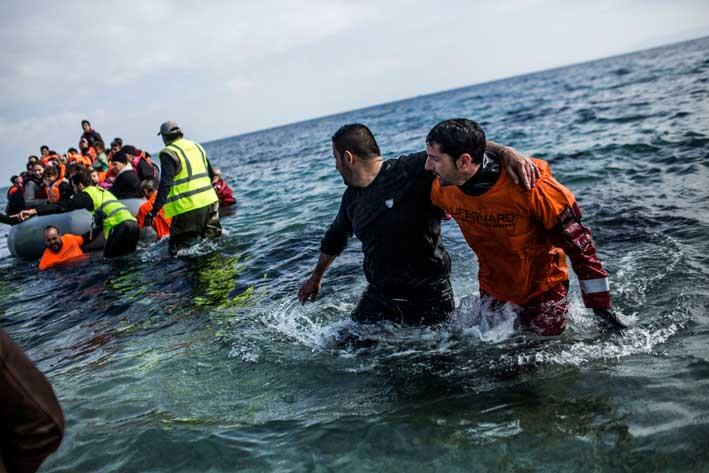The Italian authorities have apprehended the Somali national who was the subject of a massive manhunt in Malta in the lead up to last November’s Commonwealth Heads of Government Meeting and the Valletta Migration Summit.
The suspect is believed to be a key member of a migrant trafficking ring that had brought as many as 250 people, mainly of Syrian and Somali nationalities, to Malta.
The Italian authorities believe the individual arrested on Friday, who is being charged with aiding illegal immigration and aiding international terrorism suspects, was responsible for providing logistical support to the four Syrians caught last November before boarding planes bound for Malta with fake passports. Two had been caught in Bergamo and two at Rome’s Ciampino airport.
The incidents sparked terrorism fears before the two major events that had brought dozens of world leaders to Malta last November.
A subsequent manhunt in Malta last November saw the arrest of one Somali suspect while the second had presumably escaped. It is believed that the missing Somali was arrested on Friday at a hotel in Rome, and was caught as he attempted to flee from his hotel room window.

Anti-terrorism prosecutors in the northern Italian town of Brescia requested the man's arrest, alleging he supplied false documents to various people for entry into Italy and other European countries including Malta.
Italian police said yesterday that the Somali man – identified as Ali Awil Khadar, born on 1 January 1985 – was detained on suspicions of aiding illegal immigration and of also assisting persons involved in terrorist associations.
He was also found in possession of Malta-issued travel papers for political refugees (number MT9939505), issued by the Maltese authorities, as well as a suspected fake Maltese passport, according to Italian media reports.
Images released by the Italian authorities yesterday showed the Somali suspect at Bergamo airport travelling right behind the two Syrians who had been stopped at passport control. The Somali, unlike the Syrians he was escorting, managed to board the plane and come to Malta. A massive manhunt was then mounted for the Somali in Malta but he must have eluded the Maltese police and somehow managed to return to Italy.
Although the Maltese authorities at the time had insisted that the Syrians had been headed to Malta for the provision of international protection and work permits, they were subsequently arraigned in Italy on terrorism charges, which they are still facing.
At the time, the government had said that the racket had been uncovered by the Maltese Security Services working in tandem with their foreign counterparts. More stringent checks at the Italian borders and Malta’s then temporary suspension of Schengen rules due to the migration summit and CHOGM helped the Maltese authorities, working in concert with foreign intelligence services, to uncover a racket that included the falsification of European passports and the purchasing of flights from Italy to Malta for migrants intending to seek asylum, and consequently work, in Malta.

Until it was broken up, the racket had been going to for some time, before the Schengen rules were suspended by Malta and before Italy increased border security in the wake of the 13th November terrorist attacks in Paris, such individuals would pass through Customs as per usual without passport checks.
According to government sources speaking with this newspaper at the time, the Maltese authorities have been working closely with foreign intelligence services after the two pairs of Syrians were caught attempting to fly out of Italy for Malta with fake European passports – one pair from Bergamo and the other from Rome.
Overall, the racket is believed to have brought as many as 250 people to Malta to claim asylum, mainly of Syrian and Somali nationalities.
The Syria-Malta route
Sources speaking with this newspaper had also spelled out how passage to Malta was being organised which saw people travelling from Syria to Turkey and then on to Greece, where they would collect their fake European passports. From Greece they would travel with their fake documentation to Italy and board flights to Malta.
Malta’s Security Services had also established that all the flights had been booked with the same credit card number, which was linked to an e-mail address and a Maltese phone number belonging to the Somali national arrested on Friday.

‘No reason to suspect anything other than the fact they were seeking work’
Those who have made use of the racket to enter Malta through Italy mainly used forged Greek passports the government confirmed, while insisting that “there is no other reason to suspect anything other than the fact they were seeking work”.
“From the analysis of the authorities involved, these people are unrelated to terrorism. Their abuse is related to false documentation for the provision of international protection and work permits,” the government said in a statement.
One of the two Syrians apprehended last November in Bergamo as he was about to embark on a flight to Malta with a fake passport is currently answering to charges of terrorism before the Italian courts.
Thirty-year-old Alali Faowaw was initially charged only with being in possession of false documents, but after Italian prosecutors reviewed photographs of a flag bearing the Islamic State motto and of Faowaw in Islamic State gear taken from his mobile telephone, they suspected that he formed part of the Islamic State.
When he appeared in court, Faowaw said that he had suffered at the hands of the Islamic State when jihadists took over the town of Raqqa in Syria. He testified that he had returned to Raqqa after living in Greece for two years, where he also played for an amateur football team.
Forced to work as a police officer, he said he was later accused of corruption and sentenced to a fine and 100 lashes.
His co-traveller, Hazem Alhamed, said he had escaped from the village where he lived before the jihadists arrived and went to live in Saudi Arabia for two years. He first went via Turkey and then to the Balkans where he requested political asylum. Hazem said he wanted to reach Malta to meet a brother and work.
As for the images of war zones found on the mobile phones of some of those apprehended, the Maltese authorities said they believe such images were simply used to help justify their asylum claims.